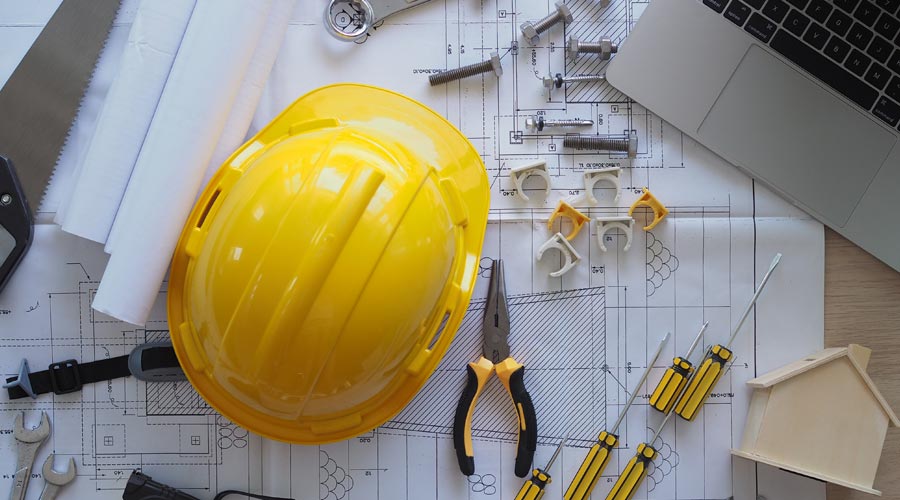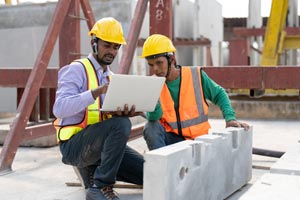Your key issues
As an organisation, you are expected to meet performance and safety criteria, while also facing new environmental and technological challenges, as well as those linked to work organisation. With the high pace of development activities, your main challenges are manifold:
- Ensuring that materials and products are delivered on time
- Maintaining a satisfactory level of quality
- Meeting deadlines
- Confirming compliance with local regulations and obtaining authorisation from the authorities
- Ensurging the availability of personnel with the necessary knowledge, experience and skills
- Meeting insurers' needs by providing third-party verification certificates/reports to comply with legal requirements
- Improving the health and safety of the public and workers
- Guaranteeing continuity of production
- Improving the performance of your risk management tools
- Developing skills, processes and management systems
- Monitoring project progress at all stages with sufficient information to make informed decisions (Go, No-Go)
A specific context
India is the fastest growing economy in the world as per recent projections by various international agencies like World Bank, International Monetary Fund (IMF), Organisation of Economic Cooperation and Development (OECD), Asian Development Bank (ADB) etc. The projected growth for 2024-25 is 6.1 to 6.7%, whereas the actual growth reported in the 1st quarter of 2024 is 8.3%. India is likely to become the third-largest economy by 2027 as per IMF and it is also estimated that India’s contribution to global growth will rise by 200 basis points in 5 years. To sustain and achieve its development objectives, the Government of India has announced huge investments all around, of which energy, agriculture, technology, industrial production, transportation network, defence, environmental protection, and human resource development programmes, are directly linked to the business of Apave in India.
The construction of new airports, bridges & highways, expansion of refineries, nuclear power projects, ports, pipeline gas networks, photovoltaic and wind energy projects, rural development programmes, focus on food & agriculture, space programmes etc. are indicators of the omni-directional development being achieved in India.
As the expected pace of production, manufacturing and construction activities are high, challenges for manufacturers and owners in terms of quality of materials, products and construction are huge. Apave, a global independent organisation, reputed as a trusted business partner can be a key stakeholder supporting owners and manufacturers to achieve their quality, health & safety and environmental objectives and ensure compliance with regulatory requirements.
Our solutions


Project Management
-
Design review
Technical designs likely to affect health, safety or the environment must generally be assessed by an independent and competent person or body. Design assessment may be required at any stage in the lifecycle of an asset, including design, detailed design, commissioning, operation or disposal. Design assessment is based on the review of drawings and design documentation.
We provide a comprehensive design assessment service covering all our market sectors, including energy, oil and gas (offshore platforms, processing plants, marine jetty structures, various types of cranes, pipelines for transporting hydrocarbons, pressure vessels and mechanical, piping, electrical and instrumentation components), and infrastructure.
-
Project support
Our project support services extend from the construction phase, to commissioning and post-commissioning activities.
Detailed engineering review during the construction phase, review of construction procedures including, but not limited to, receipt, verification of personnel qualifications, storage & handling of materials & consumables, dimensional control procedure, review of inspection & test plans, job set-up, welding, review of non-destructive testing procedures, surface preparation & painting procedures, hydrotest, mechanical clearance, pre-commissioning & commissioning procedures etc. Our support is extended to monitoring and surveillance activities during the various phases of the project.
-
Performance guarantee test
Performance guarantee tests refers to all the operational checks and tests which are necessary to determine the performance of specific equipment. These checks ensure that the capacity, efficiency and operating characteristics of the equipment in question correspond to the contract documents.
We can help you to evaluate how a project performs in terms of responsiveness and stability under a particular workload. This can be carried out to examine speed, robustness, reliability and output.
-
Lenders engineering
As lender engineers, we verify the physical status of work being implemented on sites, as well as judge and report the project finances. These services assure the lender against misuse of funds.
What our services include:
- Verify the actual status of the work carried out on the site.
- Judge and report on the quantum of money contributed and utilised for the undertaking.
- Assess construction of the project and its progress in comparison to the planned schedule.
- Undertake study and comment on various statutory approvals and clearances.
- Verify and confirm the competence of the borrower for proper execution of the project.
- Confirm whether the borrower's commitments follow project-related stipulated arrangements.
- Survey the drawdown plan for the arranged task movement.
- In case of delays, suggest remedial action for timely completion.


Safety Risk and Reliability
-
Hazard Identification studies (HAZID)
Hazards associated with a processing plant/facility are identified based on layout drawings discussed in detail with customer representatives during an interactive workshop. The results of the HAZID will then form the basis for a piping & instrumentation drawing. Apave provides experienced chairman and scribe services.
-
Hazard Operability Analysis (HAZOP)
While HAZID focuses on early hazard identification and risk assessment, HAZOP dives deep into deviations from the intended design and operational aspects. Apave provides experienced chairman and scribe services.
-
Failure Effect and Mode Analysis (FEMA)
The potential failures in a system, process or product can be systematically identified using the FEMA method. It analyses the effect of each failure mode and determines its probability of occurrence, severity of consequence and detectability. FEMA can help develop strategies to mitigate risks and reliability and safety of the system.
-
Safety Integrity Level (SIL) assignment / Verification
SIL assignment and verification is required to ensure that safety-critical systems meet certain safety standards and reduce the risks of catastrophic events. This is accomplished by initially assigning a SIL level to each safety instrumented function based on the risk reduction required and then by verifying the safety performance of the system by testing, undertaking assessments, and audits.
-
Quantitative Risk Assessment (QRA)
Quantitative risk assessment is a systematic approach to assessing and quantifying the risks associated with hazards in industrial processes or other systems (event tree analysis - ETA, fault tree analysis - FTA). It uses mathematical modelling and statistical techniques to estimate the probability and consequences of potential incidents. It helps companies prioritise risk mitigation measures to reduce incidents.
-
Flame & Gas (F&G) Mapping
The F&G mapping study helps the designer to place related detectors at specific intervals within a facility and assess the coverage afforded by the system. The study is usually performed with the help of software.
-
Reliability Centred Maintenance (RCM) / Reliability, Availability, and Maintainability (RAM) Studies
RCM is a systematic approach used to identify the most effective maintenance strategies for ensuring the reliability and safety of equipment and assets. It involves analysing the functions, failure modes, and consequences of failures for each component of a system to determine the appropriate maintenance tasks and intervals. RCM aims to optimise maintenance efforts by focusing resources on critical components that have the greatest impact on operational reliability and safety.
-
Environmental Studies
- Lightning protection study
- Environmental Impact Identification [ENVID]
Engineering Services
-
Feasibility study
A feasibility study aims to provide an independent assessment that examines all aspects of a proposed project, including technical, economic, financial, legal, and environmental considerations..
-
Life extension
Oil & gas installations and pipelines, in particular, that have surpassed their design life are re-evaluated for their integrity and fitness to continue in operation for an intended future period. The study is performed by reviewing the design adequacy with regard to the current operational requirements and environmental conditions.
-
Engineering Critical Assessment (ECA)
-
Functional Safety Assessment (FSA)
-
Risk Based Inspection (RBI)
-
Computational Fluid Dynamic (CFD)
CFD is a branch of fluid mechanics that uses numerical methods and algorithms to solve and analyse problems involving fluid flow. It involves the simulation of fluid motion and heat transfer phenomena using computational techniques rather than experimental methods.
-
Environmental studies
-
Design review of structure, mechanical, process and electrical


Asset Integrity Services
-
Corrosion Study / Assessment
-
Risk Based Inspection (RBI - Piping & Equipment, Pipelines, Structure, PSVs -RBI, based on API 580)
-
Fitness for Service (API-579)
- Level 1 assessment
- Level 2 assessment if not qualified in Level 1 assessment
- Level 3 assessment if not qualified in Level 2 assessment
-
Remaining Life Assessment (Pipelines, Piping & Equipment)
-
Fitness Certification (Oil & Gas Installations, Structure etc.)
-
Root Cause Analysis / Failure Analysis
-
Pipeline Studies
-
Reliability Centred Maintenance (RCM) & Reliability, Availability and Maintainability studies (RAM)
Focus on
feasibility studies
Feasibility study by Apave
A feasibility study is a preliminary exploration of a proposed project or undertaking to determine its merits and viability. A feasibility study aims to provide an independent assessment that examines all aspects of a proposed project, including technical, economic, financial, legal, and environmental considerations.We can help decision makers determine whether or not to proceed with projects, by providing advisory services on the below areas:
-
Technical feasibility service
In this assessment we will focus on the technical parameters of the project like design, processes, equipment, data, resources etc. A detailed roadmap can then be prepared based on technical feasibility and constraints.
-
Economic feasibility service
This assessment will give us the idea of cost/benefit analysis of the project helping organisations determine the viability, cost, and benefits associated with a project before financial resources are allocated. It also serves as an independent project assessment and enhances project credibility—helping decision-makers determine the positive economic benefits that the proposed project will provide to the organisation.
-
Legal feasibility service
This assessment investigates whether any aspect of the proposed project conflicts with legal requirements such as zoning laws, data protection acts or social media laws, among others.
-
Operational feasibility
We can do operational feasibility by undertaking a study to analyse and determine whether and how well the organisation’s need can be met by completing the project. This also examines how a project plan satisfies the requirements identified in the requirement analysis phase of system development.
-
Scheduling feasibility
This assessment is the most important for project success, after all, if a project is running behind schedule or is not completed on time, this will result in other negative impacts to the project implementation (costs, time, etc.). In scheduling feasibility, an organisation estimates how much time the project will take to complete.
Detail project report
After the planning and the designing part of a project are completed, a detailed project report is prepared. A detailed project report is a very extensive and elaborative outline of a project, which includes essential information such as the resources and tasks to be carried out in order to make the project turn into a success. It can also be said that it is the final blueprint of a project after which the implementation and operational process can occur. In this comprehensive project report, the roles and responsibilities are highlighted along with the safety measures, if any issues arise while carrying out the plan.
Apave can help you to prepare the DPR, including:
- Brief information about the project
- Experience and skills of the people involved in the promotion of the project
- Details and practical results of the industrial concerns of the promoters of the project
- Project finance and sources of financing
- Government approvals
- Raw material requirement
- Details of the requisite securities to be given to various financial organisations
- Other important details of the proffered project idea include information about management teams for the project, details about the building, plant, machinery, etc.
 Discover our accreditations and recognitions (ISO 17020 – CBB – PNGRB – PESO - …)
Discover our accreditations and recognitions (ISO 17020 – CBB – PNGRB – PESO - …)
Contact us
Why Choose
Apave India ?

Our customer relationship approach

Our competitive prices





